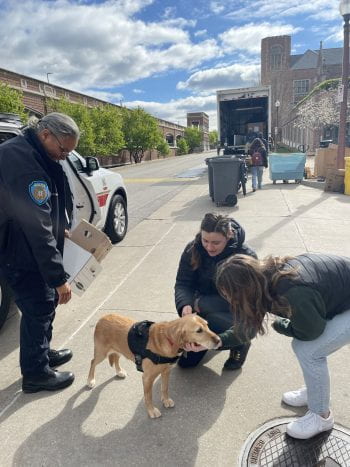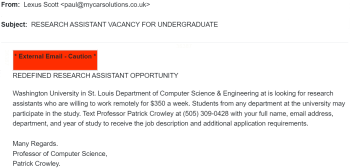Our office received a report of a vishing (fraudulent phone call) attack targeting a WashU student. In the attack, the caller claimed that the student’s social security number had been associated with overseas drug-trafficking activity. Another popular Vishing campaign involves impersonating support personnel from companies like Apple or Amazon. In this scam, the attackers call […]
Device Security for the Entire Family
The holiday season is here! As we prepare our hearths and homes to celebrate the holidays with friends and family, we sense that this season will be different. According to the National Retail Federation (https://nrf.com/media-center/press-releases/nrf-expects-holiday-sales-will-grow-between-36-and-52-percent ), online sales are expected to grow by at least 30% this year, adapting to the constraints of a pandemic […]
Thank You for Participating in Cybersecurity Awareness Month 2020
The Office of Information Security extends its gratitude to the faculty, staff, and students who participated in the events and activities of Cybersecurity Awareness Month 2020! During the month of October, we hosted a slate of webinars and presentations to help our community stay informed and empowered in the digital era. This year, our program […]
InfoSec Alert: Cybersecurity Attacks Targeting US Healthcare Systems
During the week of October 26, multiple federal agencies notified Washington University of a credible cybersecurity threat to US health care providers. This threat has impacted several hospitals across the country within the last few days, and intelligence officials suggest several hundred more may be targeted in the near future. Washington University has a dedicated […]
Welcome to Cybersecurity Awareness Month from CISO Kevin Hardcastle
Dear WashU community, Cybersecurity Awareness Month has arrived! Cybersecurity Awareness Month was launched in October 2004 by the National Cybersecurity Alliance and the U.S. Department of Homeland Security as a joint effort to raise awareness of cybersecurity issues and help people stay safe online. Now in its 17th year, Cybersecurity Awareness Month is observed around […]
October is Cybersecurity Awareness Month
Cybersecurity Awareness Month is here! Cybersecurity Awareness Month is a global effort to help everyone stay protected whenever and however they connect. The overarching theme for the month is, “Do Your Part, #BeCyberSmart.” The Office of Information Security is proud to be a Cybersecurity Awareness Month Champion, supporting online safety throughout the year. We’re here […]
Cybersecurity Awareness Month Is Right Around the Corner
October is Cybersecurity Awareness Month. Cybersecurity Awareness Month was launched as National Cybersecurity Awareness Month in October 2004 as a joint effort between the National Cyber Security Alliance and the U.S. Department of Homeland Security. The objective of National Cybersecurity Awareness Month was to raise awareness of the importance of cybersecurity and offer resources to […]
WEBINAR: Securely Managing Protected Information
The HIPAA Privacy Office, WashU IT, and the Office of Information Security invite you to attend a one-hour discussion and Q&A about safely handling protected data and using WUSTLBox to develop a secure workflow. Hosts will include Christine Schorb, HIPAA Privacy Officer, Eric Suiter, Systems Engineer with expertise in WUSTLBox, and Kevin Hardcastle, Chief Information […]
National Cybersecurity Awareness Month (NCSAM) is Coming!
WashU InfoSec is honored to be among institutions named NCSAM Champions. We champion the cause of information security in our community by offering information, resources, and events throughout the year with special offerings during NCSAM every October. Stay tuned for our schedule of October events to help you #BeCyberSmart. To see a complete list of […]
UPDATED: Security Threats Targeting COVID-19 Researchers
Law enforcement and government agencies, including the Federal Bureau of Investigation (FBI) and the Cybersecurity and Infrastructure Security Agency (CISA), have issued warnings about criminal activity targeting COVID research. Below, you will find links to relevant guidance and announcements about this threat. FBI director says China seeks to compromise U.S. firms researching coronavirus – WaPo […]
PHISHING ALERT: Email Threatening to Reveal Personal Information
The Office of Information Security has identified a phishing threat in which the sender indicates they have compromising information about the recipient, offering as proof a plaintext password that may look familiar to the recipient. These passwords are NOT an indication that the sender has access to any special information about you. They are simply […]
Profile: Betsy Ball, Information Security Architect
Please join us in welcoming Betsy Ball to the Office of Information Security’s team! Betsy comes to us with more than 30 years of IT experience, including work in user support as well as server, network, and firewall administration. In her role at WashU, she will serve as an Information Security Architect, working with the […]
Workplace Security
October is National Cybersecurity Awareness Month (NCSAM), and we at the Office of Information Security, along with our partners at Protective Services, are working to ensure the security of your personal and professional data and valuables. However, security is a shared responsibility, and we require your cooperation and support. “Office creeper” is the term of […]
NCSAM: Be in the Know About Cybersecurity
National Cybersecurity Awareness Month (NCSAM) is underway! Our month of activities began with the annual Shred IT event on the School of Medicine Campus. On Tuesday, October 1, members of our community brought 1,025 pounds of paper and 4,457 pounds of electronics to the School of Medicine campus to be securely destroyed and recycled. This […]
National Cybersecurity Awareness Month: Shred IT
On Tuesday, October 1st, the Office of Information Security, Office of Sustainability, and Operations & Facilities Management will be hosting an e-waste recycling and confidential paper shredding event. This event is the first in a series of events sponsored by the Information Security Office and our partners in celebration of National Cybersecurity Awareness Month (NCSAM). […]
Security Controls
The Office of Information Security (OIS) will review and identify the applicable security frameworks – International Organization for Standardization, National Institute of Standards and Technology (NIST) Security Controls (SP800-53) and other identified industry standards to be applied and tailored within Washington University (WashU) departments and schools. Controls will be assigned to create protection levels. Control […]
A New Look for the Information Security Website
As we celebrate the new year and try to stick to those New Year’s resolutions, The Information Security Office (ISO) is excited to announce the launch of its new website! The new informationsecurity.wustl.edu is designed in a user-friendly format so you can learn about cyber security topics and quickly find information you need. Take some time this […]
October is National Cyber Security Awareness Month
October is National Cyber Security Awareness Month and the WashU Information Security Office (ISO) wants to take this opportunity to remind students, faculty and staff to be vigilant in protecting your personal information as well as university information. As the lines between our work and daily lives become increasingly blurred, developing habits and behaviors that […]
Security Alert: Office 365 Email Phishing on Campus – October 3, 2018
Risk: High Details: The Information Security Office has received reports of phishing emails purporting to be from BJC personnel, however, the email addresses are being spoofed and used against Wash U. The phishing samples have had infected DOC files attached referring to Outstanding Invoice or Balance Discrepancies. Action: Do not try to open any suspicious files you were […]
Recommended IT Services for Confidential or Protected Information
Before using external websites or cloud services to store, create or transmit WashU Confidential or Protected information please review the tables below for approved services. If what you are looking for is not listed, the following reviews are needed. Collaboration Reference the tables below to determine which collaboration service is best for storing and sharing your data. […]
IRB Security Review
An institutional review board (IRB) applies research ethics in the review of proposed research. These boards review the research protocols and related materials of biomedical and behavioral research involving humans to assure appropriate steps are taken to protect the rights and welfare (physical and psychological) of humans participating in research studies. Federal regulations require IRB […]
HIPAA Privacy Information
Centered on your privacy Washington University health care providers respect the confidentiality of our patient’s health information by observing the highest standards of ethics and integrity. Our Notice of Privacy Practices describes your rights under HIPAA and how Washington University may use and disclose your protected health information. If you have not reviewed our Notice of Privacy Practices. […]
Information Security FAQ
Your Information
in·for·ma·tion /infərˈmāSH(ə)n/ noun facts provided or learned about something or someone Think of your personal information—such as social security numbers, credit card numbers, medical information—as the furniture in your house. Your passwords are the keys to that house. Just as you would never leave your house keys unattended or leave your front doors unlocked, you […]
Policy Update 2024
The WashU Office of Information Security (OIS) is dedicated to supporting our community by ensuring that our information security policies keep pace with the evolving digital landscape. As part of this effort, we’re excited to introduce our 2024 Policy Update, which launches the new WashU OIS Guide series. This series will guide you through our […]
Scam of the Month: Voter Registration Scams

With the approach of Missouri’s last day to register to vote before the November election, October 9, expect scammers to take advantage of the situation. We Americans are accustomed to election advertisements and voter registration campaigns, so when a scammer reaches out under the pretense of campaigning, it can be hard to spot the ruse. […]
Inside ABC: Microlearning, Macroimpact

Cybersecurity threats continuously evolve, becoming more sophisticated, relentless, and hard to detect with each attempt. Helping the WashU Community learn how to recognize, avoid, and report these threats is crucial to protecting our institution, our research, and our people from bad actors who seek to steal and hold ransom the information and resources on which […]
Chance to Win $100 in Our Monthly Challenge

The Office of Information Security (OIS) is always looking for ways to improve your security and reward your participation in helping to secure WashU. Back by popular request, the InfoSec team is continuing to assign the Inside Man series as our competition this August. The Inside Man is a soap opera-style training that covers critical […]
Scam of the Month: Remote/Part-Time Intern for a Virtual Assistant

The Office of Information Security has observed a trend in which criminals advertise a job while impersonating someone from a university in Mexico. Impersonation is one of the most effective social engineering tactics scammers use, and it can be particularly enticing if offered employment. If you see a message like the one below, please do […]
New Homepage Coming Soon

The Office of Information Security is always looking for new ways to improve our website to provide the best experience for the WashU community! Our homepage is going through a design overhaul to make accessing the critical security information you need easier. Our Current Homepage Our New Homepage Below is how the new homepage will […]
InfoSec Alert: PHI not allowed in Adobe AI Assistant

Use of Adobe’s AI Assistant with HIPAA Protected Health Information (PHI) is not permitted at WashU. While Adobe’s information security and intellectual property protections are compatible with other uses, federal law requires a Business Associates Agreement (BAA) before HIPAA PHI may be shared with a third party. Non-AI Assistant use of Adobe desktop products keeps […]
Chance to Win $100 in Our Monthly Challenge

The Office of Information Security (OIS) is always looking for ways to improve your security and reward your participation in helping to secure WashU. Back by popular request, the InfoSec team is continuing to assign the Inside Man series as our competition this July. The Inside Man is a soap opera-style training that covers critical […]
Scam of the Month: Washington University – internship and management Programs – PAID

The Office of Information Security has observed a trend in which criminals advertise a job while impersonating someone from a university in Mexico. Impersonation is one of the most effective social engineering tactics scammers use, and it can be particularly enticing if offered employment. If you see a message like the one below, please do […]
Cloud Threats, Opportunities, and Safety

As more data, identities, and services move to the cloud, they are increasingly targets of threat actors with potentially life-altering consequences. In 2017, a breach of Equifax leaked the Social Security Numbers (SSNs) of 143 million Americans. While writing this article, Ticketmaster and its vendor, Snowflake, suffered a major data breach. Those are just two […]
Chance to Win $100 in Our Monthly Challenge

The Office of Information Security (OIS) is always looking for ways to improve your security and reward your participation in helping to secure WashU. Back by popular request, the InfoSec team is continuing to assign the Inside Man series as our competition this June. The Inside Man is a soap opera-style training that covers critical […]
Scam of the Month: Direct deposit bank account changed

The Office of Information Security observed a trend where criminals email members of our community false direct deposit change notifications with a malicious link. They hope the victim will click the link and give their WashU credentials or direct deposit information. Payroll Services does not change direct deposit information. Only employees can change it themselves […]
InfoSec Alert: Microsoft ‘Recall’ Feature

Microsoft has released some Windows 11 PCs with a new feature called ‘Recall,’ which has privacy and security issues. ‘Recall,’ if enabled, takes screenshots of all activity in Windows 11 and then places that information in local storage for future access. No action is needed at this time – ‘Recall’ is off by default and […]
Inside ABC: Awareness, Behavior, and Culture

The WashU Office of Information Security (OIS) takes a holistic approach to security training and awareness. Our goal goes way beyond raising awareness through a required annual training. The Awareness, Behavior, and Culture (ABC) team aims to foster a resilient and adaptable security culture so WashU Community members know what to look out for, how […]
Chance to Win $100 in Our Monthly Challenge

The Office of Information Security (OIS) is always looking for ways to improve your security and reward your participation in helping to secure WashU. Back by popular request, the InfoSec team is continuing to assign the Inside Man series as our competition this May. The Inside Man is a soap opera-style training that covers critical […]
Scam of the Month: Duo Verification Code Text Phishing

Criminals who’ve stolen WUSTL Keys and passwords are masquerading as IT support over text messages to get us to enter Duo verification codes. Legitimate WashU employees will not ask you to enter codes into your Duo app. Only enter a verification code if you are logging in for yourself. Do not enter a code given […]
Phishing Alert: Verified Duo Push Scam

Members of the WashU community are receiving fraudulent phone calls from criminals asking them to enter a three-digit code into the Duo app. What you should do The only time you should type in the three-digit code into Duo is if you are logging in for yourself. Do not enter a code given to you […]
Chance to Win $100 in Our Monthly Challenge

The Office of Information Security (OIS) is always looking for ways to improve your security and reward your participation in helping to secure WashU. Back by popular request, the InfoSec team is assigning the Inside Man as our training competition this April. The Inside Man is a soap opera-style training that covers critical cyber security […]
Scam of the Month: Outstanding Toll Amount

Road trip season is approaching, and the FBI has observed criminals impersonating road toll collection services via text message. While there is only one toll bridge in Missouri – the Lake of the Ozarks Community Bridge (for now) – many neighboring states operate toll roads. If you see a message like the one below, please […]
Summer Break Travel and Job-Hunting Tips

Summer break is right around the corner, and many in the WashU community will be traveling or looking for a summer job. Unfortunately, the devices we rely on for managing travel have also become targets for theft and cybercrime. Whether you are searching for a job or taking a trip, please protect yourself and the […]
Scam of the Month: DEA Impersonation Phone Call

According to Washington University School of Medicine Protective Services, the WUSM Physical Therapy department received a call from someone impersonating the DEA to steal personally identifiable information. In the call, they claimed to be an investigator from the DEA headquarters, saying that a nurse practitioner had reported fraud under their name, medical license number, and […]
The Deaf Lottery Scam

Back in his federal law enforcement days, WUSM’s Assistant Director of Investigations and Crime Prevention, Steve Manley, came upon an advance fee scam. An informant who operated a corner store in East St. Louis called him one afternoon. He told Manley a customer was sending large sums of money to Nigeria via Western Union. The caller […]
Thanks for Making the E-Waste Recycling Event a Success

On Tuesday, March 26th, the Office of Sustainability and Office of Information Security hosted their biannual electronic waste recycling and secure paper shredding event on the Danforth campus. Thank you to all who supported sustainability by securely recycling their electronic waste and confidential documents. The event was a huge success. In just two and a […]
Scam of the Month: RESEARCH ASSISTANT VACANCY FOR UNDERGRADUATE

The Office of Information Security has observed a trend in which criminals advertise a job while impersonating a Professor of Computer Science and Engineering. Impersonation is one of the most effective social engineering tactics used by scammers, and it can be particularly enticing if offered employment. If you see a message like the one below, […]
Data Classification
From an information security perspective, data classification is the categorization of data according to the severity of adverse effects should those data be disclosed, altered, or destroyed without authorization.
Scam of the Month: COVID-19 Variant Poses Risks in our University
![From: Wustl Health Care Center Subject: Emergency Notice: COVID-19 Variant Poses Risks in our University I trust this message finds you in good health. I am writing to share critical information that impacts the health and safety of our academic community. Regrettably, we have recently received confirmation of a positive COVID-19 variant test result for a member of our university staff. Despite a significant portion of our staff and faculty being vaccinated, it is crucial to acknowledge that certain variants may pose challenges even to those who have received the vaccine. As a precautionary measure, we are actively initiating contact tracing to identify and mitigate potential risks. To assist us in determining whether you have been in close proximity to the affected staff member, we have established a dedicated webpage for your convenience. Please click the following link: [Access Detailed Staff Information] to review specific details about the individual in question. Prompt reporting of any interactions or contact is crucial, as it greatly contributes to the overall safety and security of our community. We understand that this news may be concerning, but please rest assured that our medical team is available to address any questions and provide guidance. You can contact them at [Healthcare@wustl.edu], and they will offer the necessary assistance. Our commitment to your well-being and the creation of a secure working environment remains steadfast. We kindly ask for your cooperation in this matter, as it is vital for our collective efforts to contain the virus and uphold the safety of our community. Confidentiality Notice: This email and its attachments are confidential and intended solely for the recipient. In line with privacy guidelines, we kindly request that you refrain from sharing or forwarding this message. PLEASE AVOID SHARING THIS EMAIL WITH ANYONE. We sincerely appreciate your dedication to our university community, and together, we will navigate through this challenge and emerge stronger. Best regards, Washington University in St. Louis Health Care Center Contact: (616) 526-7052](https://informationsecurity.wustl.edu/files/2024/01/scam_covid-ae533c8153fb28b6-350x130.png)
The Office of Information Security has identified a trend in which criminals send members of our community false COVID-19 contact tracing emails with a malicious link. They hope a victim will click the link and give their WashU credentials. In this scam, hackers use a compromised email address from Brown University to send phishing emails. […]